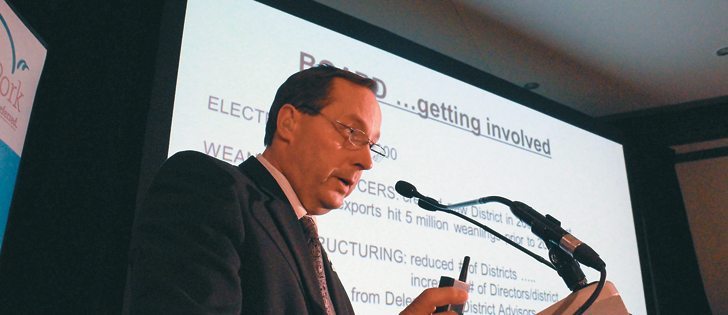Karl Kynoch, who was chair of the Manitoba Pork Council for 11 years, stepped down from his position this spring. Kynoch presided over a chaotic period, including an unprecedented moratorium on hog barn construction.
In response to public outrage over massive algal blooms in Lake Winnipeg, the province banned new hog barns and expansion of existing barns.
Manitoba pork producers have argued that the province needed a villain and blamed them, despite science showing hogs were responsible for a fraction of the nutrients entering the lake.
Read Also

Canadian Food Inspection Agency red tape changes a first step: agriculture
Farm groups say they’re happy to see action on Canada’s federal regulatory red tape, but there’s still a lot of streamlining left to be done
Kynoch recently shared his thoughts about the moratorium and the future of Manitoba’s hog sector.
Here is some of the interview The Western Producer’s Robert Arnason had with Karl Kynoch.
Western Producer: What was your most difficult or challenging period as pork council chair?
Karl Kynoch: The most challenging time I had at pork council was dealing with our own provincial government. The moratorium being put in place … was basically bad public policy due to the fact that the government had an agenda … without giving much thought to the consequences. That created huge challenges for the industry.
WP: When government imposed the temporary moratorium, in 2006, what were you expecting?
Kynoch: We were told at that time that if we did certain things … and came through the Clean Environment Commission report … the moratorium would be lifted. We believed the government was dealing with us in good faith.
WP: In 2008 the Clean Environment Commission didn’t recommend a ban on hog barn construction. Yet the government maintained the moratorium. Was that a game changing moment?
Kynoch: That really became politically challenging. The Clean Environment Commission report didn’t suit the government’s agenda. So they ignored the report…. For the pork industry, that became a huge challenge to counteract.
WP: How would you describe your relationship with the provincial government at that time?
Kynoch: The relationship was very tense, due to the fact that regulations were getting implemented without science.
WP: Was the trust broken between the two parties?
Kynoch: Absolutely.
WP: Was that trust broken both ways?
Kynoch: There was no reason for the government to mistrust the industry because we did everything that we were asked to do…. But we were told if we had a good report out of CEC we’d be able to move forward with removing the moratorium, which didn’t happen.
WP: In the 2011 election, were you hoping for a change in government and a change in policy?
Kynoch: I don’t think a new government would’ve lifted the moratorium. As being a leader of an industry, you have to walk a fine line…. You have to be very careful to not choose sides in an election period, or at any time.
WP: So you weren’t supporting or campaigning for the Progressive Conservatives in the 2011 election?
Kynoch: I would definitely not choose to support either side as being the leader of a commodity group. But an election period is a time to push your issues, to get them heard.
WP: How concerned are you about Manitoba’s hog industry?
Kynoch: It’s going to take some time for producers to get confidence back that regulations are stable … to restore that trust…. It’s going to be a long, slow haul to get it back to where it needs to be.
WP: What are your concerns?
Kynoch: Going forward, labour is going to be a huge challenge with the new regulations. You also have to have a positive image of the industry to get people to work in the industry…. And the government has put a large number of new regulations on the industry…. We’re not competitive with the U.S. to build (hog barns) right now…. The cost has significantly increased over the last number of years.
WP: Do we still have the knowledge and skilled labour to build hog barns?
Kynoch: Manitoba lost a lot of its expertise on building barns over the last number of years…. But if that demand returns to build the barns, I believe the experts will come back.
WP: Manitoba’s hog industry could be an example of how producers lost their social license to farm. How do you view it?
Kynoch: Going forward, the challenge for all of agriculture is going to be educating the public. We’re seeing increased public (expectations) on the grain farming side now…. If agriculture doesn’t do a good job of educating the public, we’re going to have some unreasonable challenges that are not justified by science, but just by myth.
















